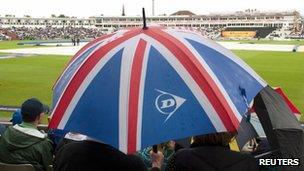Floods and rain: Is wet weather bad for business?
- Published

Some sporting events have to refund spectators if play is not possible
Even by the standards of a British summer, it's raining cats and dogs out there.
Some parts of the country have received flood warnings when we would normally be readying ourselves for garden parties and barbecues. It is thoroughly depressing.
And British businesses face serious challenges too. Already struggling with a punishing economic downturn, analysts expect many to lose out in July with sales of stocks of summer gear and gardening products hampered by record, unseasonal rainfall.
Retail analysts predict sales of everything from sandals to salads will be hit in the next fortnight by wet weather, and that even deep discounting will not recover sales.
"The hospitality sector is hit by people being discouraged from going out," says Andy Goodwin, senior economic adviser to Ernst & Young's Item Club.
"Anything that relies on good weather will be hit: open air festivals, concerts, theatres."
Staying in
Maureen Hinton, senior retail analyst at Verdict Research, says that even the deep discounts many retailers have started putting on to encourage shoppers - sometimes as much as 70% - don't make much difference.
"Sales don't always go up when people discount heavily because often, shoppers just decide they won't go out and shop, even if lots of bargains are on offer," says Ms Hinton.
The retail analyst expects a "significant effect" on sales.
Meanwhile some retailers, like furnishings company Dunelm Mill or Topps Tiles, are enjoying stronger sales in the unseasonal rain.
With June a damp squib and July predicted to go the same way, people are feathering their nests and staying indoors.
And retail analysts know department stores do well when the weather turns bad, because shoppers take cover from downpours in them. John Lewis has sold more televisions and cushions of late, for example, says Ms Hinton.
Much of the effect of any weather event is down to timing. The snowfall that arrived in the UK just before Christmas 2010 stopped people getting to the shops to buy their presents, and led to the cancellation of pre-Christmas celebrations.
By contrast, the snow at the start of 2010 simply delayed some economic activity.
Chris Williamson, chief economist at Markit, says normally if there is a week of heavy rain, people just do their shopping the following week.
"The problem this year is that we've had consistently bad weather, which means people won't buy a new pair or shorts or some garden furniture at all - they'll leave it until next year."
Raincoats and wellies
The problem for shops is that in summer, they do not have enough raincoats or wellies in stock to make up for lost sales of summer items.
They have based the seasonal stock they buy on last year's weather patterns, assuming the next year will follow.
That short-termism costs when weather patterns for the UK are becoming less predictable.
Planalytics, a company that helps its some High Street retailers prepare for the weather, uses the last ten years of weather data to come up with a baseline for the next year's weather.
"We find that weather only repeats itself 20% of the time, so if you plan by the year it will lead you in the wrong direction," says Kristin Boughter, Planalytics' manager for client services.
"It is a bit more of a conservative way to plan for supply chain and buying," Ms Boughter adds.
Why is it so wet?
Short-termism
Store managers can work around unexpected weather to an extent, by changing the way their stores are laid out and what they put in the windows.
But others are starting to make more substantial changes.
Some retailers are starting to respond to weather risk by basing some of their supply chain in the UK, rather than importing all their products. That means they do not have to buy so far ahead for seasonal needs and spend the money on importing goods they won't then shift when the rain falls or the sun shines unexpectedly.
But wages and operational costs in the UK are higher than in other countries companies import from, "so it's a balancing act - to base too much of your supply chain here would make you uncompetitive," says Ms Hinton.
She gives Inditex, the Spanish company that owns fashion chains Zara and Mango, as a good example of a company that has some longer-term, in-built ability to deal with unexpected weather. It makes most of its garments in Spain and ships only a few production elements out to South East Asia.
With a shorter supply chain, Zara can quickly change its store offering when sun turns to snow unexpectedly. "I would expect Inditex in the UK to see much less disruption from the wet July weather as a result," says Ms Hinton.
Financial hedging
The UK's biggest and richest companies, such as hedge funds, can afford to take out weather derivatives, financial insurance contracts specially created to hedge a specific weather risk that pays out if the risk event occurs.
But so far, retail analysts see no evidence that the Topshops or Sainsbury's of the world are using those, as they are complex and expensive.
"We've certainly seen the effects of the weather in our surveys - I would be surprised if it didn't get a mention in the official figures," Chris Williamson says.
Rain may be stopping both work and play this summer.
- Published26 November 2012
- Published6 July 2012